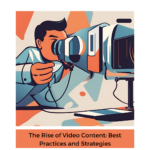How AI is Revolutionizing Digital Marketing
In the fast-paced world of digital marketing, staying ahead of the curve is crucial. One of the most transformative technologies reshaping the industry today is Artificial Intelligence (AI). By leveraging AI, marketers can create more personalized and engaging customer experiences, streamline their operations, and achieve unprecedented levels of efficiency and accuracy. This blog explores how AI is revolutionizing digital marketing and what the future holds for personalized customer experiences.
What is AI in Digital Marketing?
Artificial Intelligence in digital marketing refers to the use of advanced algorithms and machine learning techniques to analyze data, predict outcomes, and automate decision-making processes. AI technologies such as natural language processing (NLP), predictive analytics, and computer vision are becoming integral components of modern marketing strategies. These technologies enable marketers to understand customer behavior, preferences, and trends on a deeper level, allowing for highly targeted and effective campaigns.
The Impact of AI on Customer Personalization
One of the most significant benefits of AI in digital marketing is its ability to deliver personalized experiences at scale. Here’s how AI is making it possible:
- Data Analysis and Segmentation:
AI can process vast amounts of data from various sources (social media, browsing history, purchase behavior, etc.) to identify patterns and segment customers into distinct groups. This detailed segmentation allows marketers to tailor content and offers to specific audiences, enhancing relevance and engagement. - Recommendation Engines:
AI-powered recommendation engines analyze user behavior to suggest products, services, or content that align with their interests. Companies like Amazon and Netflix have mastered this approach, leading to increased customer satisfaction and loyalty. - Dynamic Content Personalization:
AI enables the creation of dynamic content that changes based on user interactions and preferences. Websites and emails can now display different messages, images, and offers for different users, ensuring a more personalized and compelling experience. - Predictive Analytics:
By analyzing historical data, AI can predict future customer behavior, such as the likelihood of a purchase or churn. Marketers can use these insights to proactively address customer needs, optimize campaigns, and allocate resources more effectively.
AI-Powered Tools and Platforms
Several AI-powered tools and platforms are transforming the digital marketing landscape:
- Chatbots and Virtual Assistants:
AI-driven chatbots provide instant, personalized responses to customer queries, improving customer service and engagement. Brands like Sephora and H&M use chatbots to assist customers with product recommendations and support. - Marketing Automation Platforms:
Tools like HubSpot and Marketo leverage AI to automate repetitive tasks, such as email marketing, social media posting, and lead nurturing. This automation frees up marketers to focus on strategy and creativity. - Social Media Analytics:
AI tools can analyze social media data to gauge sentiment, identify trends, and measure campaign performance. This real-time analysis helps marketers adjust their strategies on the fly and maximize ROI.
Benefits of AI in Digital Marketing
The integration of AI into digital marketing brings numerous benefits:
- Increased Efficiency and Productivity:
AI automates time-consuming tasks, allowing marketers to focus on higher-value activities. This efficiency leads to cost savings and improved productivity. - Enhanced Customer Engagement and Retention:
Personalized experiences foster stronger connections with customers, increasing engagement and loyalty. Happy customers are more likely to become repeat buyers and brand advocates. - Data-Driven Decision Making:
AI provides actionable insights based on data analysis, enabling marketers to make informed decisions and optimize their strategies for better results.
Challenges and Ethical Considerations
Despite its advantages, AI in digital marketing comes with challenges:
- Implementation Costs:
Integrating AI technologies can be expensive, particularly for small businesses. However, the long-term benefits often outweigh the initial investment. - Skill Gaps:
Marketers need to develop new skills to leverage AI effectively. Continuous learning and training are essential to stay competitive. - Ethical Concerns:
AI raises ethical issues, such as data privacy and algorithmic bias. Marketers must ensure transparent data practices and strive for fairness and inclusivity in their AI applications.
The Future of AI in Digital Marketing
The future of AI in digital marketing is promising, with several emerging trends set to redefine the industry:
- Voice Search and Smart Assistants:
As voice search becomes more prevalent, optimizing content for voice queries will be crucial. AI-driven smart assistants like Alexa and Google Assistant will play a significant role in customer interactions. - Augmented Reality (AR):
AI and AR can create immersive shopping experiences, allowing customers to visualize products in real-world settings. This technology is already being used by brands like IKEA and Sephora. - Hyper-Personalization:
The future will see even more refined personalization, with AI predicting not just what customers want, but when and how they want it, creating seamless and intuitive experiences.
AI is revolutionizing digital marketing by enabling unparalleled levels of personalization and efficiency. As AI technologies continue to evolve, the future of digital marketing will be defined by hyper-personalized customer experiences, data-driven decision-making, and innovative applications of emerging technologies. Marketers who embrace AI today will be well-positioned to lead the industry tomorrow.
By staying informed and adopting AI-driven strategies, your marketing agency can deliver exceptional value to clients and stay ahead in the competitive digital landscape. The future of personalized customer experiences is here, and it’s powered by AI.




